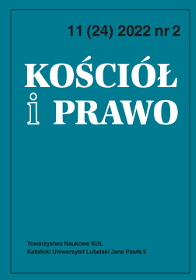Permanent Ministries as one of the Three Types of Servant Commitment of the Lay Faithful
Abstract
The article presents the sources of law, which are the basis for the establishment of the following ministries: lector, acolyte, catechist from the reform of Pope Paul VI to Pope Francis. In the next part, the author lists the servants’ own tasks and the tasks they perform on behalf of someone else. In the further part of the article, he considers the significant differences between the ministry and the function or task included in the letter of the Congregation for Divine Worship and the Discipline of the Sacraments to the Presidents of the Episcopal Conferences in connection with the issuance of the rite of establishing the ministry of catechist. After comparing these differences, the reasons why functions and tasks are more often entrusted in practice, rather than appointed to the ministry are described. The summary contains the most important differences between a ministry and a function or task.
References
Caparros, Ernest. 2002. „Comentario al can. 230.” W Comentario exegético al código de Derecho Canónico, t. 2, red. Ángel Marzoa Rodríguez, Jorge Miras, i Rafael Rodríguez-Ocaña, 196-200. Pamplona: Eunsa Ediciones Universidad de Navarra.
Erdö, Peter. 1989. „Ministerium, munus et officium in Codice iuris canonici” Periodica. De re morali canonica liturgica LXXVIII, nr 4:411-36.
Ghirlanda, Gianfranco. 1990. Il diritto nella Chiesa misterio di comunione. Compendio di diritto ecclesiale. Roma: Editrice Pontificia Università Gregoriana.
Górzyński, Józef. 2009. „Od funkcji do posługi (od munus do ministerium). Kim mają być w parafii ustanowieni lektor i akolita?” Anamnesis. Biuletyn Komisji ds. Kultu Bożego i Dyscypliny Sakramentów Episkopatu Polski 15, nr 2:82-86.
Hemperek, Piotr. 1973. „Reforma święceń niższych i subdiakonatu.” Prawo Kanoniczne 16, nr 3-4:209-28.
Kiliszek, Maciej. 2020. „Cui licet quod est plus licet utique quod est minus w wybranych aspektach vetus i novus ordo Missae.” W Regulae iuris Bonifacego VIII we współczesnych systemach prawnych, t. 2, red. Radosław Gosiewski, i Rafał Borowy, 83-109. Warszawa: Wydawnictwo Spes.
Krakowiak, Czesław. 2019. Święcenia niższe, posługi i funkcje wiernych świeckich w liturgii. Lublin: Towarzystwo Naukowe KUL.
Słowikowska, Anna. 2014. Uczestnictwo wiernych świeckich w liturgii Kościoła łacińskiego. Studium kanoniczne. Lublin: Towarzystwo Naukowe KUL.
Słowikowska, Anna. 2019. „Akolita.” W Leksykon Prawa Kanonicznego, red. Mirosław Sitarz, 73-83. Lublin: Stowarzyszenie Absolwentów i Przyjaciół Wydziału Prawa Katolickiego Uniwersytetu Lubelskiego.
Słowikowska, Anna. 2019. „Lektor.” W Leksykon Prawa Kanonicznego, red. Mirosław Sitarz, 1575-587. Lublin: Stowarzyszenie Absolwentów i Przyjaciół Wydziału Prawa Katolickiego Uniwersytetu Lubelskiego.
Tomasik, Piotr. 2022. „Stała posługa katechety to bardzo dobry znak.” https://deon.pl/kosciol/ks-tomasik-stala-posluga-katechety-to-bardzo-dobry-znak,1335167 [dostęp: 27.06.2022].
Violi, Stefano. 2019. „Officium e munus tra ordinamento canonic e comunione ecclesiale.” Stato, Chiese e pluralismo confessionale 31:118-48. https://doi.org/10.13130/1971-8543/12353
Wojtecki, Dariusz. 2022. „Katecheta czy katechista?” https://e-civitas.pl/pl/kosciol/katecheta-czy-katechista [dostęp: 27.06.2022].
Wolański, Łukasz. 2014. „Zwyczajna nadzwyczajność – o wypełnianiu funkcji nadzwyczajnego szafarza Komunii Świętej podczas liturgii.” https://vademecumliturgiczne.pl/2016/05/27/zwyczajna-nadzwyczajnosc-o-wypelnianiu-funkcji-nadzwyczajnego-szafarza-komunii-swietej-podczas-liturgii/ [dostęp: 27.06.2022].
Wolański, Łukasz. 2022a. „O właściwym rozumieniu posług, czyli dlaczego akolita to nie tylko nadzwyczajny szafarz Komunii świętej.” https://vademecumliturgiczne.pl/2022/04/24/o-wlasciwym-rozumieniu-poslug-czyli-dlaczego-akolita-to-nie-tylko-nadzwyczajny-szafarz-komunii-swietej/ [dostęp: 27.06.2022].
Wolański, Łukasz. 2022b. „Znaczenie admissio i posług w formacji diakonów stałych.” W Diakonat stały w Kościele w Polsce. T. 4: Tradycja – posługa – świadectwo, red. Waldemar Rozynkowski, 87-101. Pelplin: Wydawnictwo Bernardinum.
Zając, Paweł. 2014. „Wierny świecki jako nadzwyczajny szafarz komunii świętej (kan. 230 § 3 Kodeksu Prawa Kanonicznego z 1983 roku).” Kościół
Copyright (c) 2022 Kościół i Prawo

This work is licensed under a Creative Commons Attribution-NonCommercial-NoDerivatives 4.0 International License.





